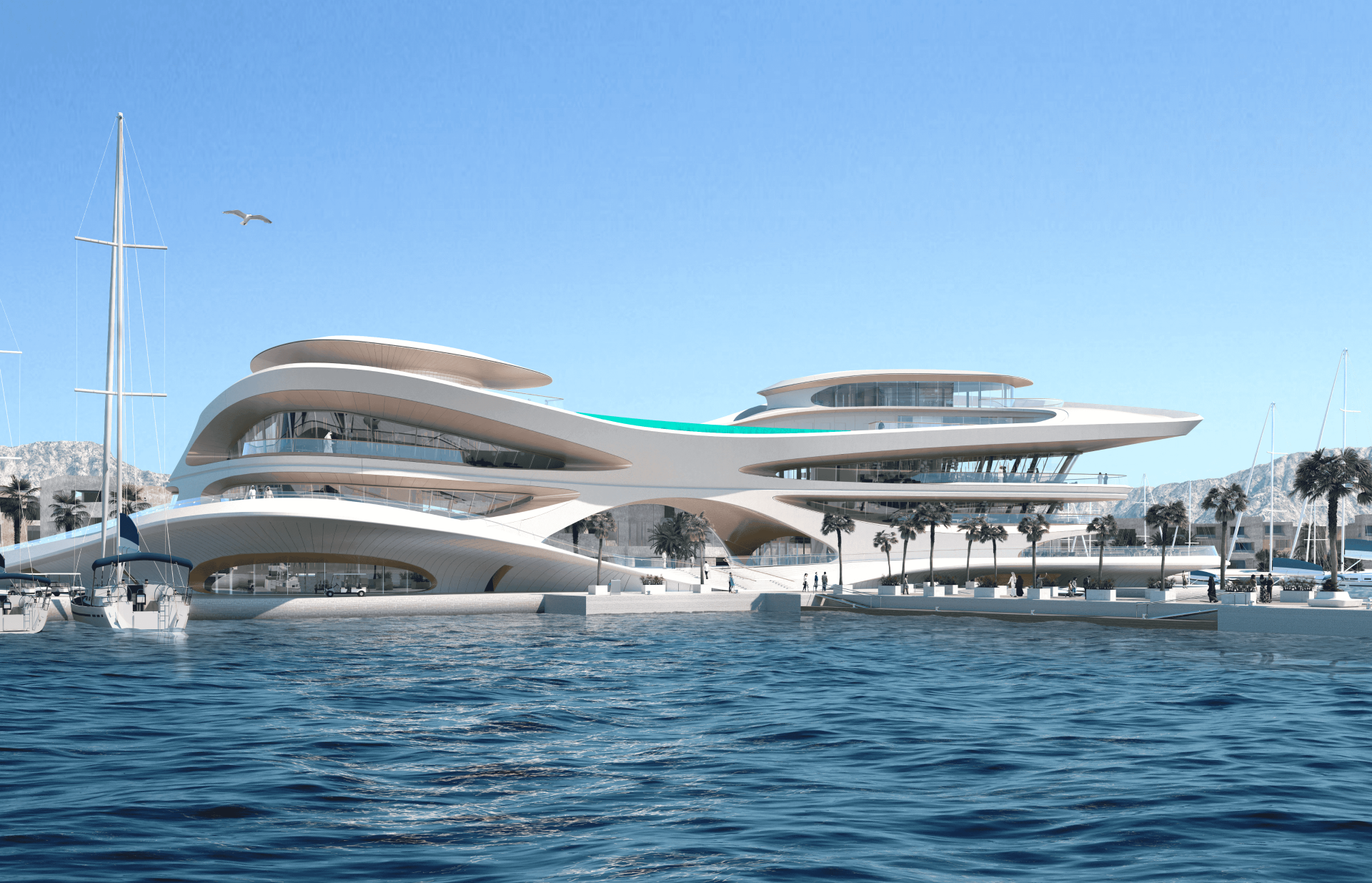Skift Take
In this Skift Middle East Report, we also look at the changing face of Saudia Arabia, looking to become a leader in sustainability, culture and yacht parties.

Middle East Travel Roundup
Get the latest news from the Middle East in one easy-to-digest newsletter.
For a long time, perhaps the only comparison one could draw between Monaco and Gulf capital Saudi Arabia was a lack of personal income tax. Now, Saudi is looking to become a bit more like Monaco when it comes to its lavish yachting industry.
The Kingdom has called upon Monaco Marina Management to help run its space-age yacht club in Amaala – one of the high-end tourism destinations along the Red Sea. The Yacht Club de Monaco company will help create events, a sailing academy, and support with training and recruitment.
The same Monaco Yacht Club signed a deal with Amaala’s regulatory body in August to host events in Saudi.
Saudi’s Sustainability Push
Saudi Arabia says it wants to lead the way in sustainable travel and tourism, calling for the world to back its Sustainable Tourism Global Center – a “multi-national coalition” for sustainability.
Announced two years ago by the country’s crown prince, the center is under the banner of the Saudi Green Initiative from Mohammed bin Salman to promote environmentalism and green energy.
At a virtual address at the Skift Global Forum 2023 last week, Gloria Guevara, Head of the Sustainable Tourism Global Center and Chief Special Advisor, called upon listeners to trust in the kingdom to help change the industry for the better.
She said: “It is clear that the sustainable agenda is more relevant than ever before.”
“The travel and tourism sector is responsible for 8% of greenhouse emissions, 12% of food waste and in terms of water consumption, travelers consume two to three times more than residents. Overcrowding, waste from travelers and deterioration of quality life for locals due to lack of destination planning.”
“Now, while positive steps are being made to address climate change. We have multiple challenges. We don’t share enough knowledge or best practices with one another. We do not have a good [sustainability] tracking system in place. There is no one place to consolidate and find all solutions and training related to our sector.”
One of the world’s largest exporters of oil, Saudi Arabia continues efforts to change its economy – and its public image – away from pumping crude. The Sustainable Tourism Global Center and Skift Advisory have partnered on the report, “Best Practices for Local Sourcing in Destinations,” which will be coming out later this year.
Today, there is a growing call for destination leaders from DMOs and DMCs, tourism business owners, and governments to take action, assess their supply chains, and identify opportunities to create more locally sourced tourism strategies.
In this soon-to-be-released report, Skift offers guidance on how destination leaders can create a new path to sustainable benefit from tourism, centered on sourcing locally — one that purposefully integrates the social-cultural, environmental, and economic implications of sustainable supply chains in ways that improve the health of the destinations where they occur.
The report also highlights best practices from successful destinations around the world, supporting destination leaders to reimagine what their local sourcing should look like and how they can optimize their economic return on investment while still protecting natural and cultural heritage.
Jeddah Gets Its Own Development Company For Tourism Sector
To keep things under government watch, Saudi Arabia has created yet another development company for tourism. Seaside city Jeddah gets the Al Balad Development Company, part of the crown prince’s Public Investment Fund (PIF)
Other development arms of PIF include Soudah Development for the recently-unveiled Soudah Peaks project; Red Sea Global for Red Sea and Amaala ultra-luxury tourism sites; Diriyah Gate Development Authority headed by Jerry Inzerillo, among others.
Al Balad Development takes charge of Jeddah’s historical district of the same name.
The company will focus on improving the district’s infrastructure, overseeing the restoration of historic buildings in Al Balad, and developing service facilities as well as recreational, residential, commercial, hotel and office spaces. The overall project development area will comprise approximately 2.5 million square meters, with a total built-up area of 3.7 million square meters. This includes 9,300 residential units, 1,800 hotel units and around 1.3 million square meters of commercial and office space.
While Saudi’s ambitions to build super-luxury hotels for Westerners often appear in headlines, the kingdom is also heavily focused on its cultural tourism sector. Sites such as AlUla have been praised for their commitment to local traditions; while mega-projects such as Inzerillo’s Diriyah Gate are spending upwards of $50 billion to make the country’s UNESCO Heritage sites something visited by millions.
Westin Hotel Opens In Ras Al Khaimah Next Year
Marriott is on a signing spree in the UAE’s northern emirate. In the span of a year, the group has announced its Le Meridien brand in Ras Al Khaimah, followed by the more flamboyant W brand, and now the more classic-luxury Westin flag.
The group’s VP of lodging development in EMEA, Saahil Lalit confirmed the signing, adding that construction is already “well underway.” The Westin will have 257 keys and is expected to open by next year, stating it will be one of the first hotels to open within Marriott’s new Ras Al Khaimah trio.
The W Al Marjan Island is expected to open in 2027 and the Le Meridien in 2026.
The Westin is the latest addition to the emirate’s development boom. Ever since the Wynn resort was announced in 2022, operators have rushed to the once-quiet city. Nobu will bring its own hotel and restaurant; Accor will bring Pullman and Sofitel; and Minor will soon open a flagship Anantara.
Dubai Airports Commits To Better Care for Travelers With Autism
The operators of Dubai International Airport are committing to be more welcoming towards travelers with autism. Dubai Airports has signed an MoU with the city’s Autism Center to make the busy airport more inclusive for those with autism and other hidden disabilities.
Measures include travel planners for pre-travel preparation and an “Autism Friendly Route”, offering a prioritized route for check-in, passport control, security checkpoints, and boarding, which can be availed when wearing the sunflower lanyard. The airport also says it has deployed specially trained guest experience staff to support travelers with hidden disabilities.
Boutique Hotel to Open in UAE Capital
Ever since it first struck oil, the UAE has opted to build some of the most spectacular – sometimes outlandish – hotels in the region. The ‘seven-star’ Burj Al Arab in Dubai, the palace-turned-resort Emirates Palace in Abu Dhabi, and the upcoming $3.9 billion Wynn in Ras Al Khaimah all showcase this.
Moving in a different direction, Abu Dhabi will soon welcome a small, boutique-feeling resort of just 22 rooms. Anantara Santorini Abu Dhabi Retreat opens before the end of the year and will be one of the smallest hotels in the country. CEO of operating company Minor, Dillip Rajakarier said: “This ultra-private property offers exceptional facilities for full buy-outs, especially those seeking an intimate boutique experience unlike anywhere else in the UAE.”
Egypt Tourism Finally Back on Track
Egypt is seeking to double the number of visitors to the country in the next five years, its tourism official told The Associated Press. Egypt is aiming at reaching 30 million visitors by 2028, as its once-thriving tourism sector recovers from the pandemic and global tensions that have stifled travel in parts, Tourism and Antiquities Minister Ahmed Issa said.
“We’re seeing unparalleled demand, unprecedented demand for travel into Egypt,” Issa said in an interview. He said Egypt had received 10 million tourists in the first eight months of 2023, and was “well on track to achieve around 15 million this year, which is going to be a record year for the tourism industry.”
Saudia Airline Goes Through a Rebrand
The national carrier of Saudi Arabia, Saudia, has had a facelift. A new livery has been introduced, along with a “digital transformation” project rollout. The rebrand “marks the beginning of a new era” for the airline.
The new brand color identity, comprised of green, blue, and sand, represents Saudia’s aim to expand its fleet and destinations, connecting the world to Saudi Arabia, emphasizing the Kingdom’s authenticity and deep-rooted values, a press release said. The rebrand also extends to cabin crew uniforms.
The Daily Newsletter
Our daily coverage of the global travel industry. Written by editors and analysts from across Skift’s brands.
Have a confidential tip for Skift? Get in touch
Tags: hospitality news, hotel news, middle east newsletter, Saudi Tourism, saudi travel, Tourism news, travel news
Photo credit: A rendering of the yacht club in Amaala. Supplied.
